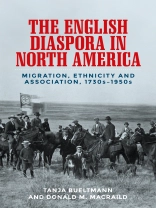Ethnic associations were once vibrant features of societies, such as the United States and Canada, which attracted large numbers of immigrants. While the transplanted cultural lives of the Irish, Scots and continental Europeans have received much attention, the English are far less widely explored. It is assumed the English were not an ethnic community, that they lacked the alienating experiences associated with immigration and thus possessed few elements of diasporas. This deeply researched new book questions this assumption. It shows that English associations once were widespread, taking hold in colonial America, spreading to Canada and then encompassing all of the empire. Celebrating saints days, expressing pride in the monarch and national heroes, providing charity to the national poor, and forging mutual aid societies mutual, were all features of English life overseas. In fact, the English simply resembled other immigrant groups too much to be dismissed as the unproblematic, invisible immigrants.
قائمة المحتويات
Introduction: ethnic associationalism and an English diaspora
1. The origins and development of the English diaspora in North America
2. Elite associations: from local to transnational
3. Independent and sectarian: working-class English associational culture
4. Ethnic activities and leisure cultures
5. Charity and mutual aid: the pillars of English associations
6. English, Scots and Germans compared: British and continental perspectives
7. The making of a global diaspora
Conclusion
Appendix 1 North American cities and towns with St George’s societies and other English associations
Appendix 2 Lodges of the Order of the Sons of St George, 1885
Appendix 3 Lodges of the Sons of England, 1896
Index
عن المؤلف
Tanja Bueltmann is Associate Professor in History at Northumbria University Donald M. Mac Raild is Professor of British and Irish History at University of Roehampton












